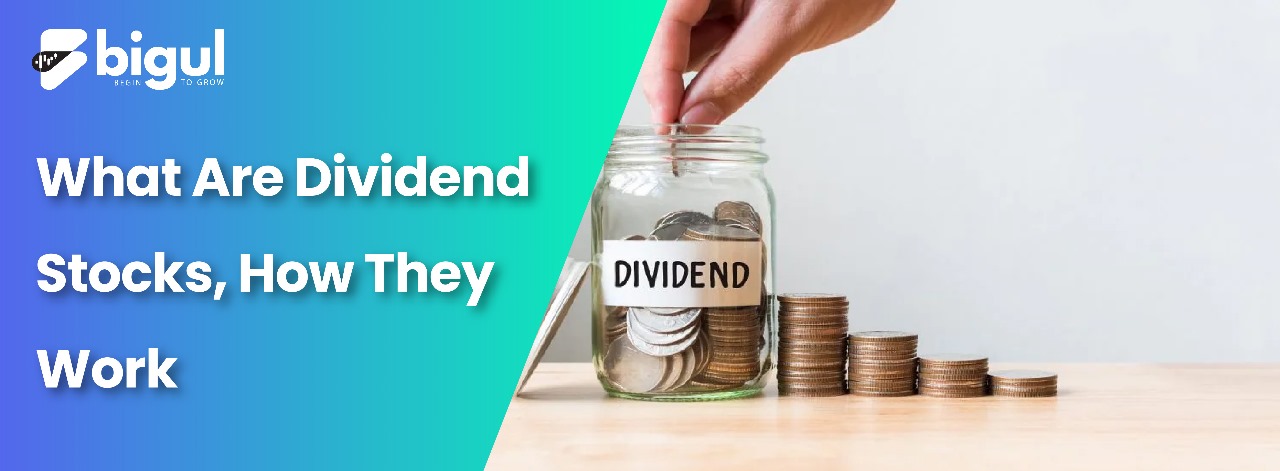Dividends are a crucial aspect of stock market investing, providing an additional source of profit beyond price appreciation. They represent a portion of a company’s earnings that is distributed to shareholders.
Dividend stocks are investments focused on generating this income through consistent dividend payments, offering investors an alternative source of profit alongside potential capital appreciation.
Understanding dividends is crucial for investors seeking to build a balanced and successful portfolio, as these payments reflect a company’s financial health and commitment to rewarding shareholders.
What is the Meaning of Dividend?
A dividend is a form of reward provided by publicly-listed companies to their shareholders, sourced from the company’s net profit. This reward can take the shape of cash, cash equivalents, shares, etc., typically distributed after essential expenses are covered. The rate of dividend is determined by the company’s board of directors, often considering the input of majority shareholders.
Alternatively, companies might retain profits for reinvestment or future needs. Dividend declarations often coincide with notable shifts in the company’s stock value.
How a Stock Dividend Works
A stock dividend, also referred to as a scrip dividend, is issued by a company as a way to reward investors without utilising available cash or to preserve it for other purposes. This type of dividend doesn’t decrease the company’s cash reserves but does raise its liabilities. Investors benefit from a tax advantage, as stock dividends are only taxed on share sales. There may be a mandated holding period for these newly acquired shares, starting the day after receipt. This strategy allows companies to reward shareholders, conserve cash, and offer tax benefits, while investors can profit from capital appreciation if they choose to sell the shares later.
Types of Dividend
There are several types of dividends that companies can offer to their shareholders. Some of the common types of dividends include:
- Special Dividend: Special Dividend is an extra payout that companies occasionally offer to shareholders alongside regular dividends. It’s often issued when the company gains windfall profits or has surplus funds. This one-time dividend is separate from the usual distribution and can reflect significant financial achievements. Thus, providing shareholders with additional returns beyond the standard dividend structure.
- Preferred Dividend: A preferred Dividend is a fixed payment to shareholders of preferred stock, offering them priority over common stockholders in receiving dividends. These dividends are often set at a predetermined rate and must be paid before any dividends are distributed to common shareholders. This structure appeals to investors seeking consistent income and reduced risk.
- Interim Dividend: An interim dividend in India is a partial distribution of profits by companies to shareholders before their financial year’s end. Typically issued when substantial profits are accrued in the first half of the year, it provides shareholders with a portion of earnings before the full-year financial results are finalised.
- Final Dividend: An interim dividend is a dividend paid by a company during its financial year before the year-end results is finalised. This dividend is typically distributed when the company has accumulated profits that it deems sufficient to be shared with shareholders. It offers shareholders a partial reward before the completion of the entire financial year and final dividend distribution.
- Cash Dividend: A cash dividend involves distributing funds to stockholders, typically from a company’s current earnings or accumulated profits. Unlike stock dividends or other forms of value, cash dividends are paid directly in money. Many brokers provide the option for shareholders to either reinvest the dividends or receive them in cash.
- Stock Dividend (Bonus Shares): Stock Dividend, also known as Bonus Shares, is a type of dividend in India where existing shareholders receive additional shares proportional to their holdings. Although it doesn’t provide immediate cash benefits, it enhances shareholder equity and spreads ownership. For instance, if a firm declares a 10% stock dividend and a shareholder holds 100 shares, they receive 10 more shares. While each share’s value may decline, the investment’s worth remains unchanged, offering future financial gains.
Impact of Dividend on Share Prices
Dividend payments may not impact a business’s overall value significantly. While dividends reduce the equity value by the dividend amount, this is a permanent change.
When dividends are declared, share prices usually rise due to increased demand from investors seeking to capitalise on dividends. However, prices often drop after the ex-dividend date, when new investors aren’t eligible for dividends.
In cases of optimistic market conditions, the stock value could rise more than the dividend, boosting the company’s value. Understanding key dividend dates is crucial to comprehend the impact on stock prices.
Benefits of Investing in Dividend Stocks
Here are some benefits of investing in dividend stocks.
- Steady Income: Dividend stocks provide a reliable income stream for investors, even during market volatility.
- Potential for Growth: These stocks can appreciate in value over time, offering both income and potential capital gains.
- Historical Stability: Companies with a history of paying dividends often exhibit strong financial health and stability.
- Diversification: Adding dividend stocks to a portfolio can diversify risk and enhance overall portfolio stability.
- Compounding Effect: Reinvesting dividends can lead to compounded growth over the long term.
- Income During Retirement: Dividends can be particularly valuable for retirees seeking regular income without selling assets.
- Less Reliant on Price Appreciation: Dividend income isn’t solely dependent on stock price increases, reducing reliance on market trends.
- Potential Tax Benefits: Dividend tax rates may be lower than those on interest income, enhancing after-tax returns.
Conclusion
Dividend stocks serve as a compelling avenue for investors seeking a steady stream of income. These equities represent shares in companies that distribute a portion of their profits to shareholders. This dual benefit of potential capital appreciation and consistent dividends makes dividend stocks an appealing choice for those pursuing a balanced investment strategy, combining stability and growth within the dynamic world of finance.








.jpg)
.jpg)
